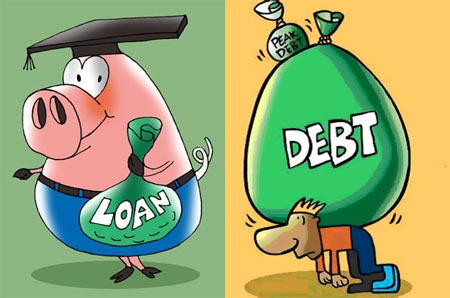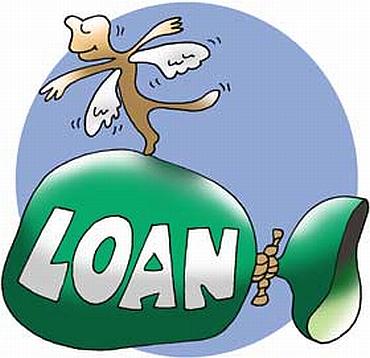Photographs: Rediff Archives Pankaj Maalde, Apnapaisa.com
Here's a surefire test -- aptly called the AI & A test -- to help you sift good loans from the bad ones.
Loans have become a part of our life as they have become easily available nowadays. Banks, housing finance companies and non-banking finance companies all are marketing heavily to sell loans to you. Different offers and teasers are available to attract you to take a loan.
Most of us apply for loan when there is some emergency and also without understanding impact of interest in the long run. One needs to understand that this may seriously affect fulfilment of your goals. Your net surplus of income should be allocated and regularly invested systematically for achieving your financial goals.
If you opt for any unplanned loan it will definitely reduce your available surplus for regular investments planned and will adversely affect building of corpus for your financial goals like children's education, marriage and retirement etc.
Recently one businessman friend confessed that he was earning a very decent amount but at the end of month 'kutch bachta nahin hai'. He then realised the need for financial planning.
While analysing the data collected we observed that he had four loans running simultaneously: home loan, property loan, car loan and above all a loan against his credit card. His monthly family income was Rs 1.67 lakh which is very decent by any standard but at the same time he was paying Rs 91,000 as EMI on different loans.
We realised his problem as to why he was not able to save enough for future goals. We did an overall review of his assets and liabilities and suggested him to prepay some of his loans bearing more than 12 per cent interest.
Surprisingly he was paying 15 per cent on his home loan taken while the same could be availed today at around 10.5 per cent. We advised him to shift his existing home loan to any bank that offered home loan @ 10.5 per cent to 11 per cent per annum. We also advised him to go for floating rate of interest instead of fixed or teaser loans.
Since there is no prepayment penalty in case of floating rate of interest now and a lot of banks have offered to waive the processing fee, one should take the maximum advantage of this by shifting their high interest bearing loans to other lenders offering lower rate of interest.
So for what purpose should one borrow?
The answer depends on purpose for which a loan is taken.
In order to help a layman take informed decision about loans we have designed AI & A test for deciding whether a loan is good or bad.
Apnapaisa is a price comparison engine that allows consumers in India the ability to compare the EMI, interest rates and other fees for home loans, car loans, personal loans, business loans, credit cards, compare online quotes and features of life insurance, health insurance, car insurance, travel insurance and other general insurance policies in India.
REVEALED: The difference between good loans and bad loans
Photographs: Rediff Archives
The first important criterion is loan should either add to your Asset or it should add to your Income. The second test is that it should be Appropriate for your circumstances.
Banks or financial institutions normally give loan so that the aggregate of all your EMI does not exceed 50 per cent of your monthly income. But a prudent financial planner will advise you to keep this ratio at 35 per cent. This means your monthly EMIs, of all your loans taken together, should not exceed 35 per cent of your monthly income.
So the first and second condition should be satisfied to arrive at a decision whether a loan is bad or good. Let us take the examples of different loans available and understand whether that loan is good or bad.
REVEALED: The difference between good loans and bad loans
Photographs: Rediff Archives
Home loan
Home loan will definitely add to your asset but one has also to see that the loan is appropriate.
Appropriateness should be judged with reference to your ability to service future EMIs. It may also add to your income if you let it out and earn rental income.
Home loans are also good as these give tax benefits and thus help you save tax.
However one needs to be very careful while buying home for investment purpose. He should look at his/her overall asset allocation. One should not be overboard on single asset class.
REVEALED: The difference between good loans and bad loans
Photographs: Rediff Archives
Education loan
Whenever you take loan for yourself or your children's higher studies that definitely will add value to your or your children's career. This will result in higher income in the future.
So though education loan does not add to your asset, it adds to your professional qualification and leads to higher income thus passing one of the tests. Interest paid for education loans are also eligible for tax exemption and thus help you save tax.
One of the other advantages of education loan is no interest is payable during the course period and repayment starts after the completion of the course when you start earning enough.
REVEALED: The difference between good loans and bad loans
Photographs: Rediff Archives
Vehicle loan
Vehicle loan is not adding anything to your asset base for long term because it starts depreciating immediately when it comes on the road, but it can add to your income.
It depends on your profession or business to take a final call. If you have to frequently travel for your business and profession and public transportation available in your area is not good than it is better to have one's own vehicle. So in some cases vehicle/car loan adds to your income but at the same time it should also be appropriate.
If you buy car just for status symbol and weekend picnic then it may not be good for your financial health.
Most of the salaried people make this mistake. Businessmen can take car loan in the name of their firm and claim all the expenses including depreciation as business expense.
REVEALED: The difference between good loans and bad loans
Photographs: Rediff Archives
Personal loan
This neither adds to your asset nor to your income. This is mostly taken to meet emergency needs. The rate of interest is also high ranging from 14 per cent to 40 per cent per annum.
One need to be very careful while taking personal loan.
REVEALED: The difference between good loans and bad loans
Photographs: Rediff Archives
Gold loan
This is the recent trend and people have started taking loans on the security of gold heavily. Again this loan neither adds to your asset nor to your income and is mostly taken to meet the emergency needs.
The rate of interest is also very high ranging from 12 per cent to 28 per cent depending on the ratio of the loan taken to the value of the gold offered as security.
One needs to be very careful while taking gold loan.
REVEALED: The difference between good loans and bad loans
Photographs: Rediff Archives
Consumer loan
Most of the people often take this loan for buying electronics and furniture fixtures at the time of festivals or family occasions.
Again this also neither adds to your asset nor to your income.
Sometimes this loan is available with zero per cent interest but this comes with heavy processing fees and you have to pay minimum two EMIs while buying the product in advance which increases your purchase cost which is nothing but interest you pay on consumer loan.
REVEALED: The difference between good loans and bad loans
Photographs: Rediff Archives
Credit card loan
Well, do you really require an explanation why it is the worst kind of loan you can ever avail? Don't ever go for such kind of loans as they are nothing but a debt trap unless you repay the entire outstanding in one installment.
So any loan which either adds to asset like home or property loan or adds to your income like education or car loan (in some cases) are good loans.
But loan which neither adds to asset nor to income are bad loans. Personal loans, mortgage loan, gold loan, consumer loans or loan against credit card are prima facie bad loans.
One needs to take help of a professional planner in case s/he is trapped in various loans.










Comment
article